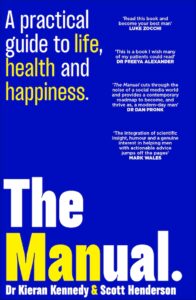 Extracted from The Manual by Dr Kieran Kennedy and Scott Henderson, Macmillan Publishers, $37.99
Extracted from The Manual by Dr Kieran Kennedy and Scott Henderson, Macmillan Publishers, $37.99
There’s probably no better, or clearer, place to start when it comes to food and the mind than what happens when there’s the mind without the food. Hanger, hangry, the hangries or just a classic old ‘mate, go eat something’ – whatever we call it, it’s fair to say we’ve all felt the link between what’s going on with our gut and how that flips back to our brain. What’s interesting though is that even with Einstein himself (we assume, surely) falling into a spate of bare belly blues now and then, it’s taken humankind a long damn time to really flesh out just how and why what we eat impacts how we feel. Because whether your belly is rumbling or full up as you read this, it turns out it really, truly does.
In this chapter we’ll quick fire our way through one of the most fascinating new kids on the block when it comes to modern medicine and mental-health research – food and mood. We’ll look at how our gut links to our brain and some practical take-homes to make sure what you’re putting in is helping brain as much as body.
So let’s dive into a world where not having enough carbs is a legit excuse for that arvo short fuse.
Your Gut
The term ‘gut’ can be a slippery one, but it’s important to flesh out here. What we’re not talking about is something hanging over a belt buckle at the end of winter. What we are talking about is the entirety of what’s known as the digestive tract, a 10-metre journey where food is broken down, absorbed and in turn eliminated through the stomach, small intestine, bowel and colon. It’s an alien landscape of twists, turns, crypts and more gas than that post-bean-feed bathroom. It’s through this landscape we take in fuel in the form of nutrients, vitamins and electrolytes in the food and fluid we chop back each day.
On microscopic inspection, the walls of our stomach and intestines are covered with billions of ridges and crypts, with finger-like projections carpeting the inner lining like hair. All up it’s a surface area that would line more than a football field if we could somehow stretch it all out fully at (gross image, agreed), and shows just how hugely efficient and able our guts are when it comes to absorbing what they need from our food and drink.
The Second Brain
Things get even cooler (read: weirder) when we consider new research that’s come to light in just the last few decades, showing that alongside those cells that line our gut and absorb and filter out what we do and don’t need from our food, the gut has a literal gut full (zing) of neurons and nerve cells too. Nerve cells line the entire way through our gut and they talk back and forth between the brain and what’s down below. Information is relayed about what food is coming in, what nutrients are (or aren’t) there and how empty or full that tummy just happens to be.
Along the way, these same nerve cells trigger the release of further chemicals and neural signals within the gut, the blood-stream and the brain, which signal whether we’re still hungry or full, whether something’s safe or toxic and gear up other organs, such as the liver, to get ready for what we’re scoffing on through. So dense are these connections and the highway of chatter back and forth between the gut and brain, that outside of your actual noggin it’s your gut that has the most neurons and nerve cells of anywhere in your body. Scientists have even gone as far as calling it out as our ‘second brain’, and that got them to thinking – if the flirting and smack talk between the brain and gut is so high, maybe that means that what’s going on in our tum and the things we’re putting into it have a big impact on the actual brain too.
Food Meets Mood
Some of the earliest research into how our gut impacts our mind came from studies linking different diets and ways of eating to rates of mental illness, emotional struggles and stress, and from there things moved into more in-depth surveys, studies and research linking what’s happening between gut and brain. From how clearly we’re able to think and problem-solve to what our mood and emotions are doing, it soon became all too clear that the gut wasn’t simply a tube that took in what we needed and expelled what we didn’t.
What the science now clearly shows is that what we eat and how well our gut health is doing can and does significantly impact our mental health. Feedback between all those neurons, known as the ‘brain–gut axis’, and the release of key neurotransmitters like serotonin, mean that our emotions are intimately influenced by how our gut, in turn, is feeling. Diets and what we eat have for a long time been geared toward the body and how we’re looking and feeling physically. What’s fascinating and pretty empowering to know now, however, is that we can eat for our mind as well.
It’s a beautiful display of what we, The Manual authors, froth over on the daily: the mind–body connection. It’s an amazing reminder that all aspects of our physical can impact our mental and vice versa.
FEELING HANGRY
Beware the perils of going too long without food. We’ve all been there; we’re hungry, and we get angry as a result. This is what the kids call ‘hangry’, aka the feeling of frustration that can only be quelled by a decent feed.
And it turns out that it’s a legitimate condition, verified by the authority on all things worth verifying . . . scientists. That’s right, our friendly labcoat wearing protectors have once again come to our defence, this time to validate our bad moods when we’ve gone more than an hour without eating.
When it’s been a few hours since your last meal, as is the case when fasting, your blood glucose levels drop, and your brain essentially goes into panic mode as it needs glucose to function. Without it, you lose concentration and get a little short.
As a flow-on effect from low blood glucose, the body releases the stress hormones adrenaline and cortisol, kickstarting your fight or flight response. Although when you’re sitting in your office, chilling at home, or walking through the shops there isn’t a whole lot to ‘fight or flight’ from, hence your built-up aggression.
You’re also more likely to get ‘hangry’ because of a cheeky little chemical called neuropeptide Y, which is released into the brain when you’re hungry. Neuropeptide Y is involved in circadian rhythms, sexual function and anxiety responses . . . not a great one to have floating around uninvited and unchecked.
‘We have been able to show that increasing ghrelin (the hunger hormone) to levels that are seen prior to meals or during fasting causes the brain to act impulsively and also affects the ability to make rational decisions,’ says author Karolina Skibicka, from the University of Gothenburg, in her study published in Neuropsychopharmacology.
Although a ‘Happy Meal’ sounds like the perfect antidote, don’t blow out when you do break your fast. Stick to healthier options, avoid bingeing and overeating and make sure your hunger isn’t a masked symptom of thirst.
Eating for Your Mind
It’s important to know that while the research is there and our knowledge is building, this is very much a growing area and, as of yet, it’s not something that doctors and psychiatrists are rolling out in everyday medicine and psychiatry. What we eat and how our gut health is going is an important component toward looking after our mood, anxiety and overall mental health but this needs to come with a super important tagline to say that in no way do mental struggles come down to not eating well or hitting the right foods. It’s also key to know that if you’re struggling we’re in no way saying that a change in diet or more fibre will necessarily solve things. Going through the usual avenues with your GP and getting help is always so important, and never a matter of shame or blame.
There are, though, some general principles we can keep in mind if we’re looking to truly combine mind and body for overall health. And with that, some science-backed need-to-knows.
The Basics
When it comes to practical and evidence-backed basics for food and mind, we’re going to keep it simple and clear. Evidence at the moment supports keeping things general and basic, and while there might be quite a lot of rumours floating around there on the internet we’re not at a point where specific foods, nutrients or vitamins have been shown to significantly impact, improve or cure mental ails (regardless of what those supermarket multi-vits or tabs might claim). Taking an ‘overall’ and general-type approach when it comes to diet and brain is important, and it’s an added bonus for us lads that it keeps it simple too.
What to Eat
Current research shows that a diet high in fruit and vegetables is one that’s best placed to support a healthy mind and brain. Given these are, as we’ve been told our whole lives, packed with all the goodies like fibre, vitamins and nutrients, it makes sense, but compared to a diet that’s high in processed foods and refined sugar this path definitely seems to be numero uno for our mental muscle.
Remembering to pump up most meals (where we can) with some form of fruit and vegetable content is a good way to go, and those rich in folate and B vitamins like dark leafy greens (Popeye was onto something for that chipper mood as well as those guns) has been shown as an added bonus. Whole foods are those as close to their natural state as possible, and so carbohydrates that are less refined and lower GI (such as oats or lentils) have been shown to keep our gut (and thus emotions) a happy zone too.
Like most areas of medical research, there are increasingly clear findings that diets high in processed foods (think white bread, the sweet stuff, processed meats . . .) aren’t just a potential hit to our heart health and cancer risk, but not so nice to our thinking, anxiety and mood either. Keeping sugars low, and processed, packaged foods to as much of a minimum as possible is a good aim if we’re eating for the brain.








Join the Discussion
Type out your comment here:
You must be logged in to post a comment.